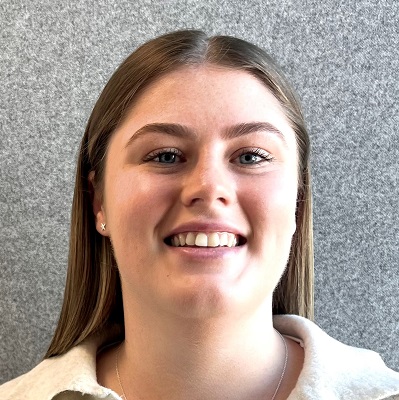
Charlie Ffrench
‘Advancing a novel biomarker for pancreatic cancer ‘
University of South Australia, SA
Awarded 2023
Co-funded by the Phillip & Glenis Hayes Memorial
“Every day 10 Australians die from pancreatic cancer and another 12 Australians are diagnosed. Pancreatic cancer remains one of the deadliest cancers in the world, with a 5-year survival rate of just 9% and unfortunately survival rates have not improved in decades.”
Researcher Profile
Charlie Ffrench is a life-saving enthusiast who completed her undergraduate degree in Laboratory Medicine (Honours) at the University of South Australia in 2021 and during that time she received several academic honours, including University Merit awards and the Martin Hansen award (for the student with the highest aggregate mark in the final two years of the degree).
Charlie started her PhD in 2022 at the Centre for Cancer Biology (University of South Australia and SA Pathology). Working with a supervisory team of scientists and clinicians, her research broadly focuses on advancing our knowledge of pancreatic cancer. Charlie dedicates much of her time to life-saving efforts, both as an active member of the Glenelg Surf Life-Saving Club and training to be the next generation of life-saving scientists. She is particularly interested in improving outcomes for patients with pancreatic cancer because it remains one of the deadliest cancers worldwide.
Every day ~10 Australians die from pancreatic cancer and another 12 are diagnosed. Clearly more needs to be done. Charlie hopes that her research will improve the early detection and treatment of pancreatic cancer to increase the survival outcomes and quality of life for patients.
Project Summary
Charlie’s PhD project focuses on a particular protein that is present on pancreatic cancer cells, desmoglein-2 (DSG2), and understanding how it might help the cancer cells to survive. Patients that express high levels of this protein on their cancer cells are predicted to die faster than patients whose cancer cells have low levels of this protein. Charlie’s PhD will investigate the mechanisms by which this protein helps the pancreatic cancer cells to grow, survive, multiply and interact with other cells in the pancreas such that it might become a target to treat this deadly disease. To achieve this, she will focus on the following aims:
Aim 1 will use laboratory-based protein assays and patient samples to investigate whether DSG2 could become a new screening test for patients with the most aggressive forms of pancreatic cancer.
Aim 2 will also use laboratory-based tests to investigate whether blocking DSG2 can inhibit pancreatic cancer cell function and survival such that it prevents disease progression.
Aim 3 will interrogate and identify the specific biological role of DSG2 in pancreatic cancer cells.
The overall aim of this PhD project is to better understand the biology of pancreatic cancer so that early detection and/or new treatments may become available for this deadly disease.
Supervisors: Professor Claudine Bonder, Professor Michael Samuel, Dr Kay Myo Min and A/Professor George Barreto.